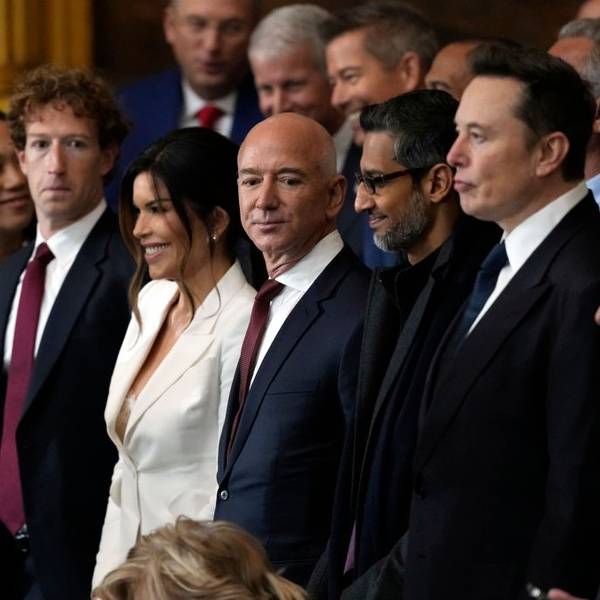
Some of the most popular social media apps are seen on an iPhone.
Top Human Rights Group Makes Case for Countries to 'Break Up' Big Tech
Amnesty International says Big Tech's consolidation of power "has profound implications for human rights, particularly the rights to privacy, nondiscrimination, and access to information."
One of the world's leading human rights groups, Amnesty International, is calling on governments worldwide to "break up with Big Tech" by reining in the growing influence of tech and social media giants.
A report published Thursday by Amnesty highlights five tech companies: Alphabet (Google), Meta, Microsoft, Amazon, and Apple, which Hannah Storey, an advocacy and policy adviser on technology and human rights at Amnesty, describes as "digital landlords who determine the shape and form of our online interaction."
These five companies collectively have billions of active users, which the report says makes them akin to "utility providers."
"This concentration of power," the report says, "has profound implications for human rights, particularly the rights to privacy, nondiscrimination, and access to information."
The report emphasizes the "pervasive surveillance" by Google and Meta, which profit from "harvesting and monetizing vast quantities of our personal data."
"The more data they collect, the more dominant they become, and the harder it is for competitors to challenge their position," the report says. "The result is a digital ecosystem where users have little meaningful choice or control over how their data is used."
Meanwhile, Google's YouTube, as well as Facebook and Instagram—two Meta products—function using algorithms "optimized for engagement and profit," which emphasize content meant to provoke strong emotions and outrage from users.
"In an increasingly polarized context, the report says, "this can contribute to the rapid spread of discriminatory speech and even incitement to violence, which has had devastating consequences in several crisis and conflict-affected areas."
The report notes several areas around the globe where social media algorithms amplified ethnic hatred. It cites past research showing how Facebook's algorithm helped to "supercharge" dehumanizing rhetoric that fueled the ethnic cleansing of the Rohingya in Myanmar and the violence in Ethiopia's Tigray War.
More broadly, it says, the ubiquity of these tech companies in users' lives gives them outsized influence over access to information.
"Social media platforms shape what millions of people see online, often through opaque algorithms that prioritize engagement over accuracy or diversity," it says. "Documented cases of content removal, inconsistent moderation, and algorithmic bias highlight the dangers of allowing a handful of companies to act as gatekeepers of the digital public sphere."
Amnesty argues that international human rights law requires governments worldwide to intervene to protect their people from abuses by tech companies.
"States and competition authorities should use competition laws as part of their human rights toolbox," it says. "States should investigate and sanction anti-competitive behaviours that harm human rights, prevent regulatory capture, and prevent harmful monopolies from forming."
Amnesty also calls on these states to consider the possible human rights impacts of artificial intelligence, which it describes as the "next phase" of Big Tech's growing dominance, with Microsoft, Amazon, and Google alone controlling 60% of the global cloud computing market.
"Addressing this dominance is critical, not only as a matter of market fairness but as a pressing human rights issue," Storey said. "Breaking up these tech oligarchies will help create an online environment that is fair and just."
An Urgent Message From Our Co-Founder
Dear Common Dreams reader, The U.S. is on a fast track to authoritarianism like nothing I've ever seen. Meanwhile, corporate news outlets are utterly capitulating to Trump, twisting their coverage to avoid drawing his ire while lining up to stuff cash in his pockets. That's why I believe that Common Dreams is doing the best and most consequential reporting that we've ever done. Our small but mighty team is a progressive reporting powerhouse, covering the news every day that the corporate media never will. Our mission has always been simple: To inform. To inspire. And to ignite change for the common good. Now here's the key piece that I want all our readers to understand: None of this would be possible without your financial support. That's not just some fundraising cliche. It's the absolute and literal truth. We don't accept corporate advertising and never will. We don't have a paywall because we don't think people should be blocked from critical news based on their ability to pay. Everything we do is funded by the donations of readers like you. Will you donate now to help power the nonprofit, independent reporting of Common Dreams? Thank you for being a vital member of our community. Together, we can keep independent journalism alive when it’s needed most. - Craig Brown, Co-founder |
One of the world's leading human rights groups, Amnesty International, is calling on governments worldwide to "break up with Big Tech" by reining in the growing influence of tech and social media giants.
A report published Thursday by Amnesty highlights five tech companies: Alphabet (Google), Meta, Microsoft, Amazon, and Apple, which Hannah Storey, an advocacy and policy adviser on technology and human rights at Amnesty, describes as "digital landlords who determine the shape and form of our online interaction."
These five companies collectively have billions of active users, which the report says makes them akin to "utility providers."
"This concentration of power," the report says, "has profound implications for human rights, particularly the rights to privacy, nondiscrimination, and access to information."
The report emphasizes the "pervasive surveillance" by Google and Meta, which profit from "harvesting and monetizing vast quantities of our personal data."
"The more data they collect, the more dominant they become, and the harder it is for competitors to challenge their position," the report says. "The result is a digital ecosystem where users have little meaningful choice or control over how their data is used."
Meanwhile, Google's YouTube, as well as Facebook and Instagram—two Meta products—function using algorithms "optimized for engagement and profit," which emphasize content meant to provoke strong emotions and outrage from users.
"In an increasingly polarized context, the report says, "this can contribute to the rapid spread of discriminatory speech and even incitement to violence, which has had devastating consequences in several crisis and conflict-affected areas."
The report notes several areas around the globe where social media algorithms amplified ethnic hatred. It cites past research showing how Facebook's algorithm helped to "supercharge" dehumanizing rhetoric that fueled the ethnic cleansing of the Rohingya in Myanmar and the violence in Ethiopia's Tigray War.
More broadly, it says, the ubiquity of these tech companies in users' lives gives them outsized influence over access to information.
"Social media platforms shape what millions of people see online, often through opaque algorithms that prioritize engagement over accuracy or diversity," it says. "Documented cases of content removal, inconsistent moderation, and algorithmic bias highlight the dangers of allowing a handful of companies to act as gatekeepers of the digital public sphere."
Amnesty argues that international human rights law requires governments worldwide to intervene to protect their people from abuses by tech companies.
"States and competition authorities should use competition laws as part of their human rights toolbox," it says. "States should investigate and sanction anti-competitive behaviours that harm human rights, prevent regulatory capture, and prevent harmful monopolies from forming."
Amnesty also calls on these states to consider the possible human rights impacts of artificial intelligence, which it describes as the "next phase" of Big Tech's growing dominance, with Microsoft, Amazon, and Google alone controlling 60% of the global cloud computing market.
"Addressing this dominance is critical, not only as a matter of market fairness but as a pressing human rights issue," Storey said. "Breaking up these tech oligarchies will help create an online environment that is fair and just."
- 66 Groups Urge House Antitrust Subcommittee to Subpoena Big Tech ›
- EU Deal on AI Act Is 'Missed Opportunity' to Ban Mass Surveillance, Say Privacy Groups ›
- Human Rights Experts: Meta's Trump-Friendly Policies Could Be 'Conduit' for 'Genocide' ›
- Global: Amnesty launches ‘Breaking up with Big Tech’ briefing ›
- A Global Message to Tik-Tok: Stop Your Profit Model of 'Toxic and Addictive' Content for Kids | Common Dreams ›
- Opinion | Everyday People Bear the Costs of Big Tech’s Hunger for Profits | Common Dreams ›
One of the world's leading human rights groups, Amnesty International, is calling on governments worldwide to "break up with Big Tech" by reining in the growing influence of tech and social media giants.
A report published Thursday by Amnesty highlights five tech companies: Alphabet (Google), Meta, Microsoft, Amazon, and Apple, which Hannah Storey, an advocacy and policy adviser on technology and human rights at Amnesty, describes as "digital landlords who determine the shape and form of our online interaction."
These five companies collectively have billions of active users, which the report says makes them akin to "utility providers."
"This concentration of power," the report says, "has profound implications for human rights, particularly the rights to privacy, nondiscrimination, and access to information."
The report emphasizes the "pervasive surveillance" by Google and Meta, which profit from "harvesting and monetizing vast quantities of our personal data."
"The more data they collect, the more dominant they become, and the harder it is for competitors to challenge their position," the report says. "The result is a digital ecosystem where users have little meaningful choice or control over how their data is used."
Meanwhile, Google's YouTube, as well as Facebook and Instagram—two Meta products—function using algorithms "optimized for engagement and profit," which emphasize content meant to provoke strong emotions and outrage from users.
"In an increasingly polarized context, the report says, "this can contribute to the rapid spread of discriminatory speech and even incitement to violence, which has had devastating consequences in several crisis and conflict-affected areas."
The report notes several areas around the globe where social media algorithms amplified ethnic hatred. It cites past research showing how Facebook's algorithm helped to "supercharge" dehumanizing rhetoric that fueled the ethnic cleansing of the Rohingya in Myanmar and the violence in Ethiopia's Tigray War.
More broadly, it says, the ubiquity of these tech companies in users' lives gives them outsized influence over access to information.
"Social media platforms shape what millions of people see online, often through opaque algorithms that prioritize engagement over accuracy or diversity," it says. "Documented cases of content removal, inconsistent moderation, and algorithmic bias highlight the dangers of allowing a handful of companies to act as gatekeepers of the digital public sphere."
Amnesty argues that international human rights law requires governments worldwide to intervene to protect their people from abuses by tech companies.
"States and competition authorities should use competition laws as part of their human rights toolbox," it says. "States should investigate and sanction anti-competitive behaviours that harm human rights, prevent regulatory capture, and prevent harmful monopolies from forming."
Amnesty also calls on these states to consider the possible human rights impacts of artificial intelligence, which it describes as the "next phase" of Big Tech's growing dominance, with Microsoft, Amazon, and Google alone controlling 60% of the global cloud computing market.
"Addressing this dominance is critical, not only as a matter of market fairness but as a pressing human rights issue," Storey said. "Breaking up these tech oligarchies will help create an online environment that is fair and just."
- 66 Groups Urge House Antitrust Subcommittee to Subpoena Big Tech ›
- EU Deal on AI Act Is 'Missed Opportunity' to Ban Mass Surveillance, Say Privacy Groups ›
- Human Rights Experts: Meta's Trump-Friendly Policies Could Be 'Conduit' for 'Genocide' ›
- Global: Amnesty launches ‘Breaking up with Big Tech’ briefing ›
- A Global Message to Tik-Tok: Stop Your Profit Model of 'Toxic and Addictive' Content for Kids | Common Dreams ›
- Opinion | Everyday People Bear the Costs of Big Tech’s Hunger for Profits | Common Dreams ›

